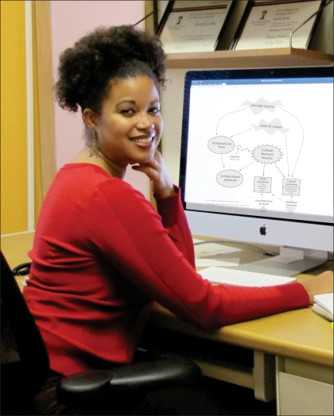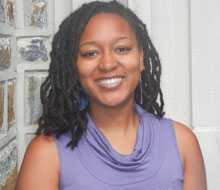“No. 1 in your life’s blueprint should be a deep belief in your own dignity, your own worth and your own somebody-ness.” — Martin Luther King Jr.
This time last year, I was spreading my wings in the big, bad world: I was a clinical psychology graduate student on the market for a tenure-track faculty job at a major research university who still believed in fairness in academe. Once interviews were over one month later, I was glued to the Psychology Job Wiki, praying for daylight to come so my job-search nightmare would end.
Since long before entering the job market last year, I have struggled with my own somebody-ness while perplexingly being accused of arrogance. Being acutely aware of my shyness and personal insecurity, I felt as if I have worn the scarlet letter — for Arrogant. But in reflecting on my experiences on the job market last year, I’ve recognized the value of fostering quiet arrogance as a woman of color within a system that would rather I didn’t exist.
It is with this newly adopted arrogance that I recount my experiences on the job market to highlight systemic discrimination in academic job searches. In exposing my naïveté and wounds, I have hope for our collective sanity as scholars who continue to be marginalized.
Job Market Expectations and Realities
As a black woman who developed cultural betrayal trauma theory — a framework that implicates societal inequality in the outcomes of violence within minority groups — I expected to experience discrimination before I received campus invitations. Mindlessly assuming my application dossier would eliminate me from consideration in departments that devalue the work of women of color, I looked forward to in-person interviews free of discrimination.
And although the job market was painful, I would be remiss if I did not acknowledge the many positive experiences I had in this process. In the first round of applications, I received six phone or video interviews for faculty positions and three on-campus visits. At various points throughout the interview process, I was shocked by the level of respect I was shown from senior and high-status faculty, junior faculty and graduate students, both of color and white. The professional connections I made at multiple departments have resulted in a growing network of collegial support and respect.
Yet alongside those positive experiences, I also experienced discriminatory behavior throughout campus visits. The first was when a white male faculty member told me that I had explained my own theory on cultural betrayal trauma incorrectly. Next, a senior white female faculty member described cultural betrayal trauma theory to me as my “ideas” with air quotes and expressed her concern that my work was not scientific enough for that top-ranked department. Finally, while I was explaining how cultural betrayal can occur in rapes perpetrated by black men against black women, a white male faculty member interrupted me to suggest that being raped by a black man is simply worse for any woman, black or white.
Perhaps because I had expected kinship from minority faculty, my most painful interaction came from a high-ranking male faculty member of color. In probably a genuine attempt to help me, he expressed concern that publishing my researchfindings for the would undermine my academic credibility. Painting a one-dimensional picture of university life, he suggested that academe might not be for me. Having not expected such comments from a faculty member of color, I felt a profound cultural betrayal. Even though I can sympathize with the compromises he has had to make as an elder in the field, to this day, I have yet to forgive him. Yet to heal.
Those experiences were exclamation points amid an ongoing barrage of condescension. I remember leaving interviews, thinking, “Am I stupid? They’re talking to me like I’m a complete idiot.” I checked in with my white colleague allies who told me they were sure everything was going fine: You’re qualified! Your CV speaks volumes, and you explain your work so well!
What I Learned
It was not until the interviews were over, with no job offers, that I reached out to faculty of color. I was validated: they told that I wasn’t crazy (well, except for assuming that I wouldn’t experience discrimination while interviewing –that was a little crazy). I was reminded of things I already knew but had somehow forgotten: the ubiquity of antiblack microaggressions; critical race theory, which centralizes the experiences of people of color (not their supportive white colleague allies); and the vast literature detailing the toll of perceived discrimination.
Facing impending unemployment in a field I had spent 10 years preparing for, I went through my second wave of applications. I received two job offers, ultimately accepting my current position as a fellow in the Postdoctoral to Faculty Transition Program at Wayne State University, with placement at the Merrill Palmer Skillman Institute.
The campus visit was unlike most of the others. I was not subjected to any open discrimination. I was spoken to respectfully, with my expertise valued. This interview resulted in a speedy job offer, with a negotiated, stellar start-up package. With one semester done, I feel I am working in a nontoxic environment — a rare academic feat I was unsure was possible after my experiences last year.
Returning to My Arrogance
I do not envy those academics currently on the job market. Nevertheless, the threat of attacks on marginalized scholars is ever looming. Therefore, at a time when so many of us are being explicitly and implicitly devalued — as humans, souls and scholars — I hold my arrogance close to my heart. Instead of waiting for them to please just notice my value, I know who I am and what I have to offer. With my diplomas and awards strewn across my office, I make the decision to not feel ashamed for being good at what I do, while continuing to possess the rebellious perseverance that I hope will carry me for a career to come.
Will you join me?
Bio

Jennifer M. Gómez is a postdoctoral fellow in the Wayne State University Postdoctoral to Faculty Transition Program at Merrill Palmer Skillman Institute. She developed cultural betrayal trauma theory to examine outcomes of violence in minority populations.

 Note: this was originally published on our career advice column on Inside Higher Ed (
Note: this was originally published on our career advice column on Inside Higher Ed ( Note: this blog post was originally published on
Note: this blog post was originally published on